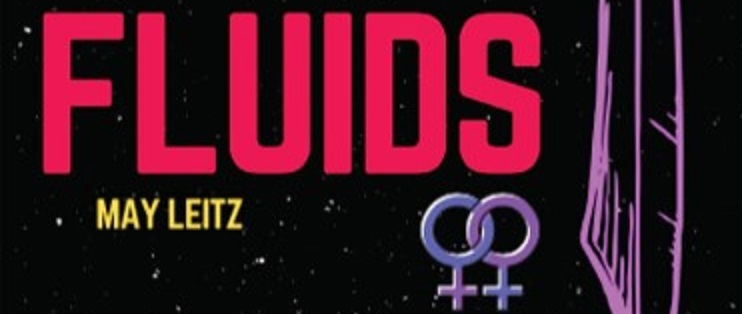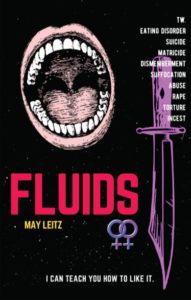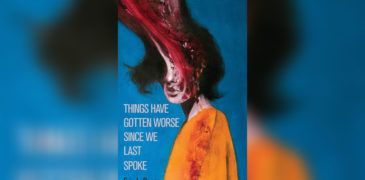
In order to establish the empty existence of the titular American Psycho, Bret Easton Ellis describes in excruciating detail every aspect of Patrick Bateman’s life. From the shoes on his feet to his Oliver Peoples glasses – from ice cubes in soy sauce to new age menus at pretentious restaurants – Ellis lists page after page of minutiae. The violent shift in content (expensive clothes and fancy food make way for rape and cannibalism) is not mirrored in tone; Bateman recounts dinners and dismemberments with little differentiation. Notwithstanding infrequent but intense dissociative episodes, Bateman considers making dinner reservations over a conference call as important as shoving a plastic tube into a girl’s vagina. May Leitz’s scorching debut novel Fluids recalls much of what makes American Psycho a modern classic. Not only does the main character’s directionless life take a turn for the violent, but the novel also descends into a gruesome, visceral, revelatory exploration of humanity.

Fluids first edition cover
Throughout the pandemic, Lauren has been obsessively swiping on dating apps. A string of sexual encounters has left her desperate for a true connection. Then she meets Dahlia. Immediately, they are enamoured of each other, baring their souls over the phone. Convinced that this is true love, Lauren casts herself as the hero in Dahlia’s life; she alone can save her from a transphobic town, and a mother who will never truly understand her. When the two women meet, the lines between love and hate, and desire and obsession blur, and neither of them will ever be the same again.
May Leitz – also known as Nyx Fears – describes herself as a ‘horror personality’. On YouTube, she covers everything from online slasher games to controversial horror masterpieces. She also creates pop, punk, and electronic music. Her debut novel firmly cements her as one to watch in the horror sphere. Where other writers may produce labours of love, Fluids is a true labour of hate, a sort of trauma exorcism. Leitz writes in the afterword that Fluids is “the worst book.” Worst or not, the title is certainly apt: piss and shit, cum and spit stain every page, not to mention vomit (of which there is a copious amount). Reading Fluids leaves one’s hands tacky. A thick layer of grime coats these people’s lives like dirt on a windowpane. Of course, dirty windows can be cleaned – the sun let in once more – if only we have strength enough to get up and clean them.
Lauren, whose head we live in for a while, is a fascinating mess. In order to explore the “hellish” 2021 gay experience, Leitz presents us with a young woman who craves human contact. In the first of three parts, she is a tragic figure. She makes terrible decisions, but we sympathise. Her relationship with Dahlia is blatantly co-dependent. Dahlia needs someone, and Lauren needs to be needed. Gradually, Dahlia is revealed to be the true protagonist. Her narration – like Lauren’s – is unreliable, but her elisions and misdirects are protective measures. The central relationship spirals into violence and coercion, while the novel hurtles toward extreme violence and horror. Many readers may not know exactly how they feel about Fluids until the conclusion of that first part. It is here that Leitz shows her hand, and reveals to us a mere sliver of what she has in store.

Fluids second edition cover
Fluids is a self-published novel, and that is hard to ignore. Typos and confusing syntax abound, and the structure needs tightening. Leitz opts for a dual narrative, and at least once, the perspective switch takes place in the middle of a chapter. Instead of a deliberate tactic to confuse the reader, this feels like a mistake. That being said, Leitz has produced a raw, thrillingly gruesome debut – one that asks no easy questions, and that attempts to answer them honestly. Aside from the character work (Dahlia and Lauren are both deeply compelling), most impressive is the description of gore. As casually gruesome as Sayaka Murata’s Earthlings, scenes of murder, rape, and torture range from distressing and gnarly to darkly comic. In any other book, these scenes would feel absurd. In Fluids, we believe every word.
American Psycho presents to us an irredeemable mess of a man. Despite flashes of humanity, Bateman is inextricably linked to the society that created him. His fatalistic, almost suicidal musings reveal a person to whom we can (for better or worse) relate. Fluids’ Lauren is similar. At first, despite her undeniably inappropriate actions, we feel for her. We understand how she has ended up this way. We hate how she handles her feelings, but we hope she can redeem herself. Leitz – thank God – will not allow it. Instead, she forces us to watch as Lauren projects the worst parts of herself onto the woman she claims to love. Leitz refuses to draw a veil over the abuse Dahlia suffers: “…it’s the abuse I have experienced, so it had to be here.” We suffer through it with her, in hopes that when the worst is over, Dahlia can finally bloom like her namesake.
You can now purchase a copy of the second edition of Fluids directly from the author.
More Book Reviews
Hey there GoH fam! Dustin here again with another edition of ‘Recent Reads’, where I dive into my thoughts on three books I’ve lately read. I’m keeping things bloody with a… At the tender age of four, Kanako Inuki was handed a shiny new five-yen coin. Promising the same allowance each month, her mother took her to a bookstore and let… Bringing you a list of the most terrifying books we’ve read this past year. Hold onto your hats, it’s going to be a bumpy ride. List: Becoming the Boogeyman –… Hello, horror fiends! Dustin here again with another edition of Recent Reads. Well, it’s just Read this time. Your boy’s kind of been in a reading slump. Okay, and a writing… Eric LaRocca brings us a short but darkly sweet tale of epistolary horror. While it may not be spilling blood by the bucketful, his novella of sadomasochism gone wrong had… With a dark dream in his heart, Richard Chizmar started Cemetery Dance Publications in 1988. In the decades to follow, Mr. Chizmar has published countless works as well as made…Recent Reads: Let the Right One In, Disco Deathtrap, There’s Someone Inside Your House
Be Very Afraid of Kanako Inuki! (2022) Book Review | Cute Girls Doing Cruel Things
Top 10 Reads for the Spooky Season 2023
Recent Read: Division X Book Review – Gruesomely Bloody Werewolf Action
Things Have Gotten Worse Since We Last Spoke Book Review – What Have You Done Today to Deserve Your Eyes?
Memorials by Richard Chizmar Book Review
Isabelle is a writer from the UK who enjoys alternative manga and horror films. When not writing, you can probably find Isabelle buying books or obsessing over Martin and Lewis.





